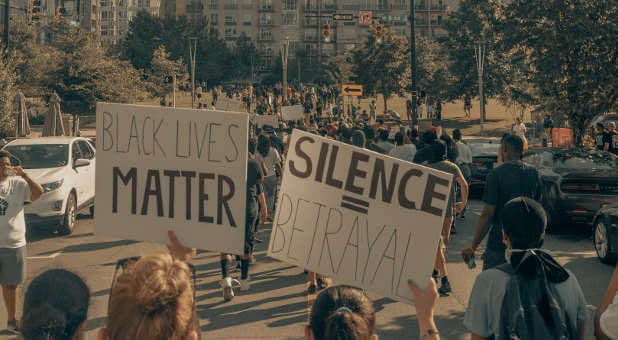George Floyd’s brutal asphyxiation in Minneapolis ripped open the wounds of slavery and segregation for the entire African American community in our country. Being captured on video by eyewitnesses made the murder-event more graphic and grievous.
It has given social justice warriors justified reason to protest and for others to commit flagrant destruction and theft.
Washington, D.C., Mayor Muriel Bowser has added a “slogan name” to 16th Street, north of Lafayette Park and the White House. It now features street signage saying, “Black Lives Matter Plaza.” She then ordered the actual street pavement painted for two blocks, using large, yellow, block-letters in a mural saying, “Black Lives Matter.”
Later, she apparently allowed or aided local protesters to paint the pavement of an adjacent street with the controversial protest slogan, “Defund the Police.” Los Angeles Mayor Garcetti says this doesn’t necessarily mean to abolish the police. Rather, it means to “redirect” large sums from the police budget to social justice causes and minority community efforts.
But reducing funds for police inevitably means a policing slowdown and a reduced police presence. It doesn’t seem that this approach will reduce crime nor provide safer communities. Just ask the homicide-riddled black communities in Chicago and the owners of businesses vandalized and looted in our major cities in recent days and weeks. Even minority-owned businesses were violently destroyed, along with the dreams of their entrepreneurial owners.
In his revealing and meaningful article, “American Racism: We’ve Got So Very Far to Go,” David French describes the challenges he and his family encountered after adopting a black child. The experiences she went through shaped his view of racism—American racism.
Near the end, he concludes “you don’t have to be a critical race theorist, agree with arguments about implicit bias, or buy into the radical social platform of Black Lives Matter to reach consensus on some changes that can make a difference” (The Dispatch).
I urge you to read the entire article.
Apparently, the Black Lives Matter organization and a sister organization, Movement for Black Lives, promote more than racial respect and social equality. They also promote a “radical social platform,” which Ryan Bomberger, a biracial social commentator identifies in his “Top 10 Reasons I Won’t Support the Black Lives Matter Movement” at Townhall.com, quoting from BLM and M4BL websites and documents.
An African American friend explained to me the trauma he experienced as a young boy in the South, watching his father demeaned by [a racially offensive phrase] and then threatened at knifepoint “if you ever drive down this road again.”
That young boy grew up, served his country in Vietnam, went to college and worked for elite companies but still has to keep alert for circumstances which could be adversely interpreted or negatively affect him or his family. This ought not to be the case in this “land of the free and the home of the brave.”
He and my other African American friends understandably view the current protests (not the violence and looting) with a broader perspective than I will ever adequately perceive. But I want to.
Black lives do matter! My pastor, Tim Clark, says it is “a statement of truth and worth.” They matter to God, and they must matter to me and to you.
I want to affirm and better appreciate and respect my fellow human beings, made in God’s image and for whom Jesus of Nazareth, the Jewish Messiah and the Gentile’s Savior, died and now lives forevermore!
Paul says that “creation waits in eager expectation for the children of God to be revealed” (Romans 8:19, NIV). What does that mean? Could this tragic time of racial unrest be the pivot point for God’s grace in true Christian believers to manifest or reveal His love and peace to an expectant world? Could such a demonstration of grace effectively overcome hatred, demonstrate true love and see our nation healed (2 Chron. 7:14) of the evils of racism, selfishness and greed? Could a watching neighbor, co-worker or relative come to “know we are Christians by our love?” (see John 13:35.)
“Christ’s love compels us … that those who live should no longer live for themselves but for Him who died for them and was raised again” (2 Cor. 5:14-15).
I don’t want to “live for myself.” Rather, I want to better understand the hurt and the history of African Americans and Hispanics, as well as Asian, African, European and Middle Eastern immigrants—all immigrants, legal and illegal. (Legalities are a different set of issues and deserve humane discussions, constitutional decisions and equitable governmental processes.)
If I want to “have the same attitude that Christ Jesus had” (Phil. 2:5a, NLT), I must seek to “live in a manner worthy of the gospel of Christ” (Phil. 1:27b, HCSB). He was the incarnate God, yet he did not demand His godly rights or exercise His personal liberties.
Likewise, if I am to share His attitude of mind, I must not be defensive and demanding. Rather, I must follow Him in humility and “value others above yourselves, not looking to your own interests but each of you to the interests of others” (See Phil. 2:3b-4, NIV)
This, too, matters. {eoa}
Gary Curtis served in full-time ministry for 50 years, the last 27 of which he was part of the pastoral staff of The Church on The Way, the Van Nuys, California Foursquare Church. Now retired, Gary continues to write a weekly blog at worshipontheway.wordpress.com and frequent articles for digital and print platforms. Gary and his wife live in Southern California and have two married daughters and five grandchildren.












































